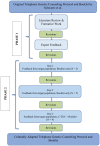Cultural adaptations to a telephone genetic counseling protocol and booklet for Latina breast cancer survivors at risk for hereditary breast and ovarian cancer
- PMID: 36694918
- PMCID: PMC10182423
- DOI: 10.1093/tbm/ibac106
Cultural adaptations to a telephone genetic counseling protocol and booklet for Latina breast cancer survivors at risk for hereditary breast and ovarian cancer
Abstract
Telephone genetic counseling (TGC) is accepted as standard clinical care for people seeking hereditary cancer risk assessment. TGC has been shown to be non-inferior to in-person genetic counseling, but trials have been conducted with a predominantly highly educated, non-Hispanic White population. This article describes the process of culturally adapting a TGC protocol and visual aid booklet for Spanish-preferring Latina breast cancer survivors at risk for hereditary breast and ovarian cancers. The adaptation process included two phases. Phase 1 involved a review of the literature and recommendations from an expert team including community partners. Phase 2 included interviews and a pilot with the target population (n = 14) to collect feedback about the adapted protocol and booklet following steps from the Learner Verification and Revision Framework. We describe the adaptation process and report the main adaptations following the Framework for Reporting Adaptations and Modifications to Evidence-based Interventions (FRAME). Adaptations in Phase 1 were responsive to the target population needs and characteristics (e.g., delivered in Spanish at an appropriate health literacy level, addressing knowledge gaps, targeting cultural values). Phase 2 interviews were crucial to refine details (e.g., selecting words) and to add components to address GCT barriers (e.g., saliva sample video). Cultural adaptations to evidence-based TGC protocols can increase the fit and quality of care for historically underserved populations. As TGC visits become routine in clinical care, it is crucial to consider the needs of diverse communities to adequately promote equity and justice in cancer care.
Trial registration: ClinicalTrials.gov NCT03959267.
Keywords: Cultural adaptations; Equity; Genetic counseling; Hereditary breast and ovarian cancers; Telehealth.
Plain language summary
This article describes the process of adapting a telephone genetic counseling protocol and visual aid booklet for Spanish-preferring Latina breast cancer survivors at increased risk for hereditary breast and ovarian cancer (HBOC). The cultural adaptation process followed two phases. In the first phase, the authors reviewed the literature and obtained insights from interdisciplinary experts. In the second phase, the authors received iterative feedback from fourteen Latina women who were breast cancer survivors, spoke Spanish as a first language, and met criteria to be considered at increased risk for HBOC. Revisions to the protocol and visual aid booklet were conducted iteratively following feedback from the expert team, after the first five women reviewed the booklet, after the second five women reviewed the booklet, and after the final four women completed the entire culturally adapted telephone genetic counseling protocol with the booklet. The final adaptations to the protocol and visual aid booklet were responsive to the target population’s needs. Most adaptations made were regarding content. For example, simplifying the material presented, adding culturally relevant images, and developing a video explaining how to collect a saliva sample. Culturally adapting health interventions can improve health outcomes in historically marginalized populations and promote equity.
© Society of Behavioral Medicine 2023. All rights reserved. For permissions, please e-mail: journals.permissions@oup.com.
Similar articles
-
Provider discussion of genetic counseling among high-risk Spanish-preferring Latina breast cancer survivors.Transl Behav Med. 2022 Oct 7;12(9):900-908. doi: 10.1093/tbm/ibac031. Transl Behav Med. 2022. PMID: 36205471 Free PMC article.
-
Development of a culturally tailored genetic counseling booklet about hereditary breast and ovarian cancer for Black women.Am J Med Genet A. 2010 Apr;152A(4):836-45. doi: 10.1002/ajmg.a.33187. Am J Med Genet A. 2010. PMID: 20358592
-
A pilot randomized trial of an educational intervention to increase genetic counseling and genetic testing among Latina breast cancer survivors.J Genet Couns. 2021 Apr;30(2):394-405. doi: 10.1002/jgc4.1324. Epub 2020 Sep 16. J Genet Couns. 2021. PMID: 32936981 Free PMC article. Clinical Trial.
-
Comparing Outcomes of Genetic Counseling Options in Breast and Ovarian Cancer: An Integrative Review .Oncol Nurs Forum. 2018 Jan 1;45(1):96-105. doi: 10.1188/18.ONF.96-105. Oncol Nurs Forum. 2018. PMID: 29251290 Review.
-
Influence of race/ethnicity on genetic counseling and testing for hereditary breast and ovarian cancer.Breast J. 2009 Sep-Oct;15 Suppl 1:S56-62. doi: 10.1111/j.1524-4741.2009.00798.x. Breast J. 2009. PMID: 19775331 Review.
Cited by
-
Improving animated instructional videos for colorectal cancer screening: An application of learner verification and revision.Transl Behav Med. 2025 Jan 16;15(1):ibaf020. doi: 10.1093/tbm/ibaf020. Transl Behav Med. 2025. PMID: 40526315
References
-
- Weitzel JN, McCaffrey SM, Nedelcu R, MacDonald DJ, Blazer KR, Cullinane CA.. Effect of genetic cancer risk assessment on surgical decisions at breast cancer diagnosis. Arch Surg. 2003; 138(12):1323–1328. - PubMed
Publication types
MeSH terms
Associated data
Grants and funding
LinkOut - more resources
Full Text Sources
Medical
Research Materials
Miscellaneous


